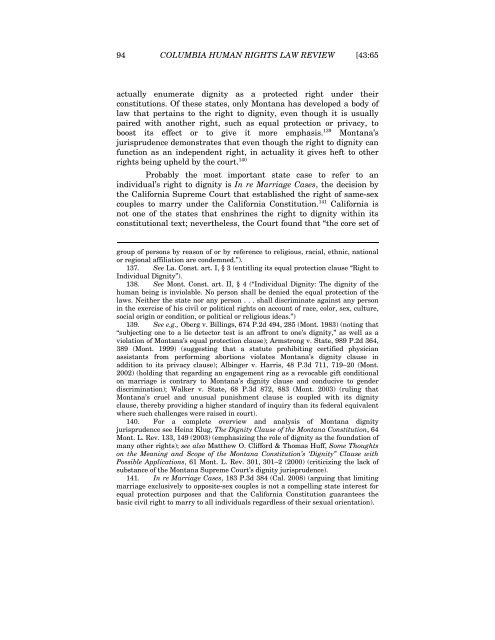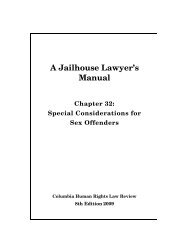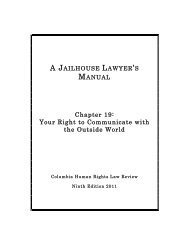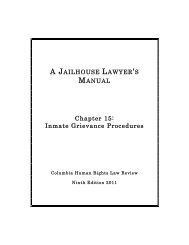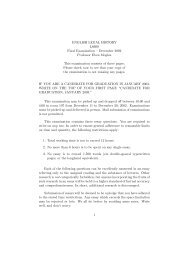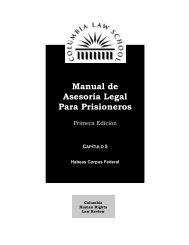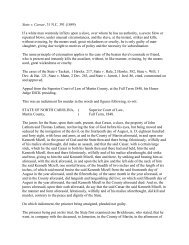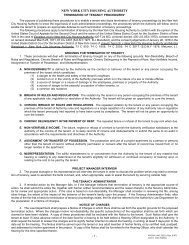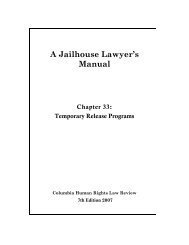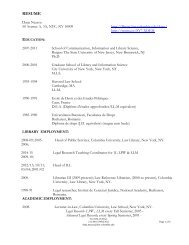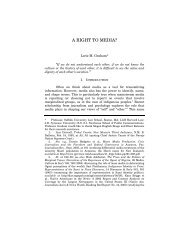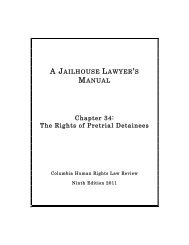The Right to Dignity Rex D. Glensy - Columbia Law School
The Right to Dignity Rex D. Glensy - Columbia Law School
The Right to Dignity Rex D. Glensy - Columbia Law School
You also want an ePaper? Increase the reach of your titles
YUMPU automatically turns print PDFs into web optimized ePapers that Google loves.
94 COLUMBIA HUMAN RIGHTS LAW REVIEW [43:65<br />
actually enumerate dignity as a protected right under their<br />
constitutions. Of these states, only Montana has developed a body of<br />
law that pertains <strong>to</strong> the right <strong>to</strong> dignity, even though it is usually<br />
paired with another right, such as equal protection or privacy, <strong>to</strong><br />
boost its effect or <strong>to</strong> give it more emphasis. 139 Montana’s<br />
jurisprudence demonstrates that even though the right <strong>to</strong> dignity can<br />
function as an independent right, in actuality it gives heft <strong>to</strong> other<br />
rights being upheld by the court. 140<br />
Probably the most important state case <strong>to</strong> refer <strong>to</strong> an<br />
individual’s right <strong>to</strong> dignity is In re Marriage Cases, the decision by<br />
the California Supreme Court that established the right of samesex<br />
couples <strong>to</strong> marry under the California Constitution. 141 California is<br />
not one of the states that enshrines the right <strong>to</strong> dignity within its<br />
constitutional text; nevertheless, the Court found that “the core set of<br />
group of persons by reason of or by reference <strong>to</strong> religious, racial, ethnic, national<br />
or regional affiliation are condemned.”).<br />
137. See La. Const. art. I, § 3 (entitling its equal protection clause “<strong>Right</strong> <strong>to</strong><br />
Individual <strong>Dignity</strong>”).<br />
138. See Mont. Const. art. II, § 4 (“Individual <strong>Dignity</strong>: <strong>The</strong> dignity of the<br />
human being is inviolable. No person shall be denied the equal protection of the<br />
laws. Neither the state nor any person . . . shall discriminate against any person<br />
in the exercise of his civil or political rights on account of race, color, sex, culture,<br />
social origin or condition, or political or religious ideas.”)<br />
139. See e.g., Oberg v. Billings, 674 P.2d 494, 285 (Mont. 1983) (noting that<br />
“subjecting one <strong>to</strong> a lie detec<strong>to</strong>r test is an affront <strong>to</strong> one’s dignity,” as well as a<br />
violation of Montana’s equal protection clause); Armstrong v. State, 989 P.2d 364,<br />
389 (Mont. 1999) (suggesting that a statute prohibiting certified physician<br />
assistants from performing abortions violates Montana’s dignity clause in<br />
addition <strong>to</strong> its privacy clause); Albinger v. Harris, 48 P.3d 711, 719–20 (Mont.<br />
2002) (holding that regarding an engagement ring as a revocable gift conditional<br />
on marriage is contrary <strong>to</strong> Montana’s dignity clause and conducive <strong>to</strong> gender<br />
discrimination); Walker v. State, 68 P.3d 872, 883 (Mont. 2003) (ruling that<br />
Montana’s cruel and unusual punishment clause is coupled with its dignity<br />
clause, thereby providing a higher standard of inquiry than its federal equivalent<br />
where such challenges were raised in court).<br />
140. For a complete overview and analysis of Montana dignity<br />
jurisprudence see Heinz Klug, <strong>The</strong> <strong>Dignity</strong> Clause of the Montana Constitution, 64<br />
Mont. L. Rev. 133, 149 (2003) (emphasizing the role of dignity as the foundation of<br />
many other rights); see also Matthew O. Clifford & Thomas Huff, Some Thoughts<br />
on the Meaning and Scope of the Montana Constitution’s ‘<strong>Dignity</strong>” Clause with<br />
Possible Applications, 61 Mont. L. Rev. 301, 301–2 (2000) (criticizing the lack of<br />
substance of the Montana Supreme Court’s dignity jurisprudence).<br />
141. In re Marriage Cases, 183 P.3d 384 (Cal. 2008) (arguing that limiting<br />
marriage exclusively <strong>to</strong> oppositesex couples is not a compelling state interest for<br />
equal protection purposes and that the California Constitution guarantees the<br />
basic civil right <strong>to</strong> marry <strong>to</strong> all individuals regardless of their sexual orientation).


